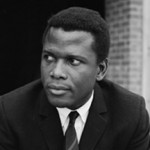See the original post:

You may know Sidney Poitier as the first black man or woman to win an Academy Award for Best Actor, but how many of his movies have you actually seen? Below is a list of his 10 best films, watch a few for the first time or watch them again and enjoy a true master at work. Poitier was born in 1927 in Miami, Florida, to Bahamian parents, and he grew up in the small village of Cat Island, Bahamas. At the age of 16 he moved to New York City and soon began working as a janitor for the American Negro Theater in exchange for acting lessons. After performing in plays throughout the 1940s he made his acting debut in the 1950 film “No Way Out. No Way Out.” The rest is cinematic history. Sidney Poitier Bio from PBS Disagree with the list? Did we miss one? Let us know what you think in the comments area below. 10. The Bedford Incident (Columbia, 1965) Ben Munceford (Poitier) is a reporter who is onboard the USS Bedford to interview the captain (Richard Widmark) when a Soviet submarine is detected. Widmark’s character relentlessly pursues the submarine to the bitter and horrific end. The movie is an edge of the seat thriller and Poitier delivers as the lone civilian on the ship trying to find out what makes the captain tick. 9. Edge of the City (MGM, 1957) One of many movies tackled by Poitier that explores relationships between whites and blacks. In this film, Poitier’s character, Tommy Tyler, befriends a white young drifter, Axel Nordmann, played by John Cassavetes. Tommy mentors Axel and teaches him how to stand up for himself. When tragedy strikes near the end of the film the lessons from Tommy spur Axel into action. The film was one of the firsts to portray an interracial friendship and would help lay the ground work for future films that would portray interracial romantic relationships and eventually marriage. The movie was priased by the NAACP, Urban League and the American Jewish Committee. Poitier got his first acting award nomination for his role earning a BAFTA nomination for Best Actor in a Leading Role. 8. To Sir, With Love (Columbia, 1967) 1967 was a banner year for Poitier who released three films, including “To Sir, With Love,” which earned him the title of top box office star of the year. The first time a black actor earned that role. Poitier is sharp as Mark Thackeray, a teacher who deals with social and racial issues in an inner city London school. This was a role reversal for Poitier who earlier in his career played the disruptive student in the 1955 film “Blackboard Jungle,” which dealt with similar issues. 7. Blackboard Jungle (MGM, 1955) Glenn Ford plays the lead as an idealistic teacher trying to get through to inner-city youths, but Poitier comes alive and owns the screen in one of his early roles as Gregory Miller, the leader of the troubled students at North Manual High School. 6. A Patch of Blue (MGM, 1965) The film depicts the relationship between a black man (Poitier) and a blind white teenager (Elizabeth Hartman) and the obstacles and prejudice they encounter as they fall in love in the racially charged and divided 1960s. The film was modified when it was shown in the south, removing the scenes of Poitier and Hartman kissing. Poitier was nominated for his fifth Golden Globe Award for his role as Gordon Ralfe, something he did not receive for his other major depiction of an interracial relationship in “Guess Who’s Coming To Dinner.” 5. Guess Who’s Coming to Dinner (Columbia, 1967) Poitier shares the screen and matches acting chops with heavyweight stars Katharine Hepburn and Spencer Tracy in a drama about parents coming to terms with their white daughter bringing her soon to be black man husband home. The movie was groundbreaking in its positive depiction of interracial marriage, which had been illegal in most state and was still illegal in 17 southern states until June 12, 1967 when the Supreme Court ruled on Loving v Virginia and ended all race-based legal restrictions on marriage in the US. 4. Lilies of the Field (United Artists, 1963) His Oscar role! Poitier’s portrayal of Homer Smith, an itinerant worker who helps a group of nuns construct a new chapel, earned him his second Academy Award nomination and one and only win. It was the first time a black man or woman had ever won a Best Actor award. Interesting fact, when Smith sings “Amen” it’s actually Jester Hairston singing and not Poitier. Poitier did however do all his own acting, and he earned his Oscar. 3. The Defiant Ones (United Artists, 1958) Sidney Poitier and Tony Curtis play two prisoners who escape a chain gang while still shackled to one another. The two are of different races, different backgrounds and they have a mutual distain for one another, but they must cooperate in order to evade law enforcement officials constantly tracking them. The role of Noah Cullen earned Poitier his first Academy Award nomination, Curtis would also be nominated for his role in the film but both actors lost that year to David Niven. 2. A Raisin in the Sun (Columbia, 1961) Poitier shows off his acting chops in this adaptation of Lorraine Hansberry’s play of the same name. The film has a simple plot, a black man, Walter Lee Younger (Poitier), shares a small apartment with his wife, son, sister and mother. They struggle to live their lives and when they receive $10,000 from an insurance policy paid after the Younger patriarch’s death they must decide how to use it. Most of the movie takes place in their small apartment and it’s really up to the actors to command your attention and keep the movie moving and Poitier and the supporting cast do just that. The movie is at times uplifting and other times heart wrenching but always powerful and poignant. Acting at its best. 1. In the Heat of the Night (United Artists, 1967) Drama doesn’t get any better than this. Poitier plays Philadelphia Detective Virgil Tibbs who becomes entangled in a southern murder mystery and battles intense racial prejudice, even risking his life, while solving a crime in Sparta, Mississippi. The interaction between Poitier’s Tibbs and Police Chief Gillespie (played by Rod Steiger) is as honest and raw as it is intense. The movie was so successful and powerful that it spun off another Poitier movie “They Call me MISTER Tibbs” and a television show by the same name in the 1980s. Watch the trailer below. Disagree with the list? Did we miss one? Let us know what you think in the comments area below.




























